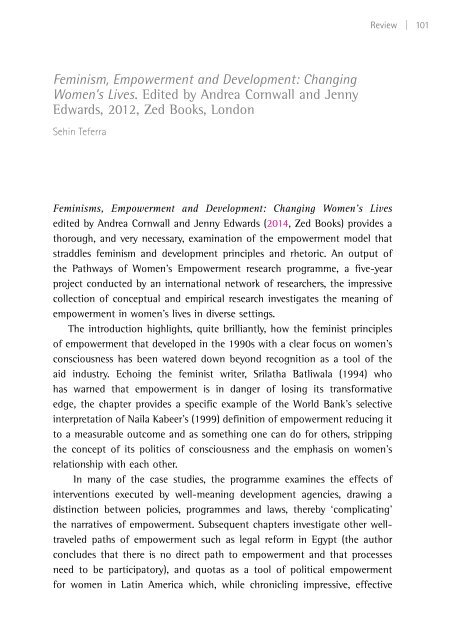Create successful ePaper yourself
Turn your PDF publications into a flip-book with our unique Google optimized e-Paper software.
Review | 101<br />
<strong>Feminism</strong>, Empowerment <strong>and</strong> Development: Changing<br />
Women’s Lives. Edited by Andrea Cornwall <strong>and</strong> Jenny<br />
Edwards, 2012, Zed Books, London<br />
Sehin Teferra<br />
<strong>Feminism</strong>s, Empowerment <strong>and</strong> Development: Changing Women’s Lives<br />
edited by Andrea Cornwall <strong>and</strong> Jenny Edwards (2014, Zed Books) provides a<br />
thorough, <strong>and</strong> very necessary, examination of the empowerment model that<br />
straddles feminism <strong>and</strong> development principles <strong>and</strong> rhetoric. An output of<br />
the Pathways of Women’s Empowerment research programme, a five-year<br />
project conducted by an international network of researchers, the impressive<br />
collection of conceptual <strong>and</strong> empirical research investigates the meaning of<br />
empowerment in women’s lives in diverse settings.<br />
The introduction highlights, quite brilliantly, how the feminist principles<br />
of empowerment that developed in the 1990s with a clear focus on women’s<br />
consciousness has been watered down beyond recognition as a tool of the<br />
aid industry. Echoing the feminist writer, Srilatha Batliwala (1994) who<br />
has warned that empowerment is in danger of losing its transformative<br />
edge, the chapter provides a specific example of the World Bank’s selective<br />
interpretation of Naila Kabeer’s (1999) definition of empowerment reducing it<br />
to a measurable outcome <strong>and</strong> as something one can do for others, stripping<br />
the concept of its politics of consciousness <strong>and</strong> the emphasis on women’s<br />
relationship with each other.<br />
In many of the case studies, the programme examines the effects of<br />
interventions executed by well-meaning development agencies, drawing a<br />
distinction between policies, programmes <strong>and</strong> laws, thereby ‘complicating’<br />
the narratives of empowerment. Subsequent chapters investigate other welltraveled<br />
paths of empowerment such as legal reform in Egypt (the author<br />
concludes that there is no direct path to empowerment <strong>and</strong> that processes<br />
need to be participatory), <strong>and</strong> quotas as a tool of political empowerment<br />
for women in Latin America which, while chronicling impressive, effective


